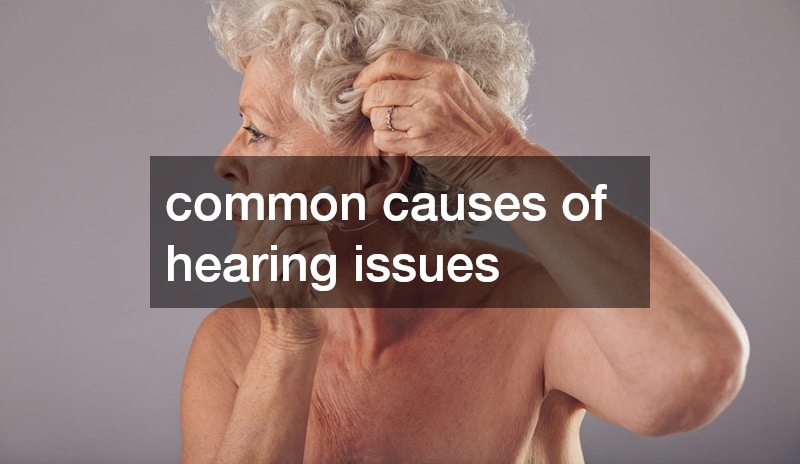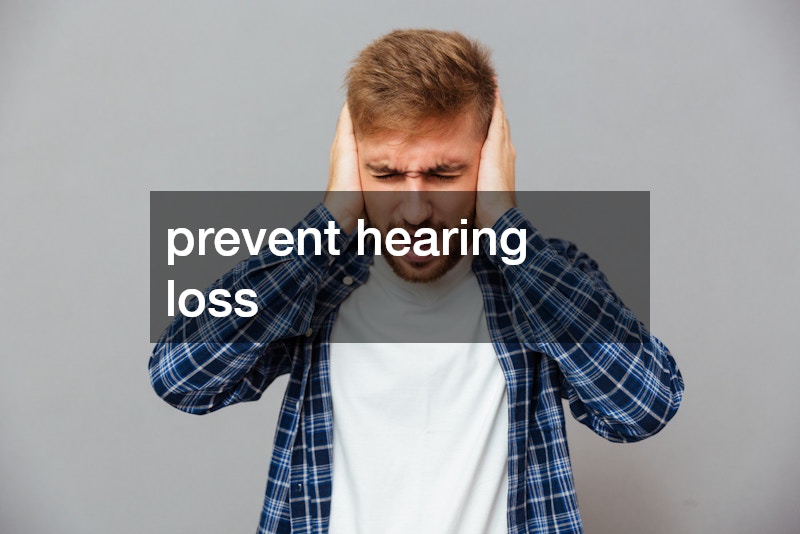Understanding hearing issues is critical for maintaining overall health and well-being. Below, we explore common hearing issues faced by adults and the professionals who are equipped to help. By becoming informed about hearing issues in adults, we can take proactive steps to preserve and improve our auditory health! Keep reading to learn more.

What are the most common causes of hearing issues in adults?
The most common causes of hearing loss in adults include age-related hearing degeneration, also known as presbycusis, and prolonged exposure to loud noises. Presbycusis is a natural part of aging and typically affects both ears equally, making it one of the leading causes of hearing concerns among older adults. Excessive noise exposure, whether from occupational hazards or recreational activities, can damage the inner ear’s hair cells, leading to noise-induced hearing loss.
Other factors contributing to hearing loss include ear infections, head injuries, and certain medical conditions such as diabetes and hypertension. Ototoxic medications, which are drugs that can harm the ear, also play a role in causing hearing impairment. These medications include some antibiotics, chemotherapy agents, and high doses of aspirin.
Genetic predisposition can also increase the risk of hearing loss. If there is a family history of hearing issues, it is crucial to monitor hearing health closely and seek advice from an ear doctor or audiologist for early intervention and management.
How can I tell if I have a hearing problem?
Recognizing the signs of hearing loss early is essential in seeking timely treatment and minimizing its impact on daily life. Common symptoms include frequently asking others to repeat themselves, needing to turn up the volume on the television or radio, and having difficulty understanding conversations in noisy environments. If you notice these signs, it may be time to consult a primary care doctor for an initial assessment.
Other indicators of potential hearing issues in adults include experiencing a ringing or buzzing in the ears, known as tinnitus, and feeling that sounds are muffled or unclear. Some people may also find social interactions exhausting or might start avoiding social settings due to difficulty hearing, which can lead to feelings of isolation and frustration.
If you suspect you have a hearing problem, it is crucial to schedule a comprehensive hearing evaluation with an audiologist. Audiologists are trained professionals who specialize in diagnosing and treating hearing and balance disorders, and they can provide valuable insights and recommendations tailored to your specific needs.

What can I do to prevent hearing loss?
Preventing hearing loss involves adopting healthy habits and protecting your ears from potential damage. One of the most effective measures is avoiding prolonged exposure to loud noises. When exposed to loud environments, such as concerts or construction sites, wearing ear protection such as earplugs or noise-canceling earmuffs can significantly reduce the risk of hearing damage.
It is also essential to maintain good ear hygiene and seek prompt treatment for any ear infections or medical conditions that could affect hearing. Regular check-ups with a primary care doctor can help monitor overall health and address any emerging issues that could impact auditory health. Additionally, managing chronic conditions such as diabetes and hypertension through proper diet, exercise, and medication can help protect your hearing.
Another preventive strategy is to be cautious with the use of ototoxic medications. If you need to take these drugs, discuss potential alternatives or protective measures with your healthcare provider to minimize the risk to your hearing. By incorporating these preventive practices into your routine, you can significantly reduce the likelihood of developing hearing problems.
How do hearing aids work?
Hearing aids are small electronic devices designed to amplify sound and improve hearing issues in adults. These devices consist of a microphone, an amplifier, and a speaker. The microphone picks up sound from the environment, which is then converted into electrical signals by the amplifier. These signals are processed and boosted before being delivered to the ear through the speaker.
Modern hearing aids come with a variety of features and settings that can be customized to the user’s specific hearing needs. Many hearing aids can filter out background noise, enhance speech clarity, and adapt to different listening environments automatically. Investing in a quality hearing aid can make a significant difference in communication and overall quality of life.
Consulting with an ear doctor is essential when selecting and fitting hearing aids. These professionals can perform thorough hearing assessments and recommend the most appropriate hearing aids based on the severity and type of hearing loss. An audiologist can also provide guidance on maintenance, troubleshooting, and adjustments to ensure the device’s optimal performance. Be sure to choose an ear doctor with proper medical inventory management so hearing aids are readily available to you.
What are the alternatives to hearing aids for hearing issues in adults?
While hearing aids are the most common solution for hearing loss, there are alternative options that may be appropriate for some individuals. Cochlear implants, for instance, are medical devices that can provide a sense of sound to people with severe hearing loss who do not benefit adequately from hearing aids. The implant bypasses damaged hair cells in the inner ear and directly stimulates the auditory nerve.
Assistive listening devices (ALDs) are another option for those who struggle with specific situations, such as hearing conversations in noisy environments or hearing alarms and doorbells. These devices include amplified telephones, personal FM systems, and TV listening systems. ALDs can be used in conjunction with hearing aids or as standalone solutions.
Some individuals may also benefit from lifestyle changes and communication strategies. Learning lip-reading, employing visual cues, and using speech-to-text apps are practical methods to improve communication without technological aids. Consulting with hearing health professionals, such as ear doctors, can help determine the most suitable alternatives based on individual needs and preferences.

Who are the professionals that can help with hearing issues in adults?
Several professionals are specialized in diagnosing and treating hearing issues. Primary care doctors play a vital role in the initial detection and referral for hearing problems. They can conduct basic hearing screenings and direct patients to specialists for further evaluation and management. If necessary, they can also coordinate care with other healthcare providers.
Audiologists are the primary specialists for hearing and balance disorders. They conduct detailed hearing tests, fit and adjust hearing aids, and provide rehabilitation therapy. Audiologists are also knowledgeable about assistive listening devices and can recommend the best options based on individual hearing needs.
Ear doctors, or otolaryngologists, are medical doctors who specialize in ear, nose, and throat conditions. They can diagnose and treat a wide range of hearing issues in adults, including infections, balance disorders, and more advanced cases of hearing loss. These professionals are also involved in surgical interventions, such as cochlear implants and other corrective procedures.
What should I expect during a hearing test?
A hearing test typically begins with a review of your medical history and a discussion of any symptoms you are experiencing. The audiologist may ask questions about your hearing difficulties, exposure to noise, medications, and family history of hearing loss. This information helps guide the assessment and tailor recommendations to your specific needs.
The test itself involves several components to determine hearing issues in adults. Pure-tone testing measures the quietest tones you can hear at different pitches, while speech testing evaluates your ability to hear and understand speech at various volumes. Tympanometry assesses how well your middle ear is functioning, and otoacoustic emissions testing checks for hair cell function in the inner ear.
After the tests, the audiologist will explain the results and discuss potential treatment options. Depending on your hearing loss severity, recommendations may include hearing aids, cochlear implants, or other assistive devices. Understanding your health insurance plan and individual health insurance benefits can also help you navigate the costs associated with hearing care.
Can hearing loss be reversed or cured?
The possibility of reversing or curing hearing loss depends on its cause. Sensorineural hearing loss, which results from damage to the inner ear or auditory nerve, is generally permanent and cannot be cured. However, hearing aids and cochlear implants can significantly improve hearing and communication for individuals with this type of hearing loss.
Conductive hearing loss, caused by problems in the outer or middle ear, can often be treated or reversed medically or surgically. Treatments may include removing earwax blockages, addressing ear infections, or repairing structural abnormalities. It is essential to consult with an ear doctor to determine the most appropriate treatment based on the specific condition.
Emerging research and advancements in health care services continue to explore potential cures and treatments for hearing loss. Gene therapy, hair cell regeneration, and other innovative approaches hold promise for future breakthroughs. Staying informed about these developments can provide hope and additional options for those affected by hearing loss.

How does hearing loss impact daily life?
Hearing loss can significantly affect various aspects of daily life, including communication, social interactions, and emotional well-being. Difficulty hearing can lead to misunderstandings, frustration, and withdrawal from social activities. Over time, these challenges can strain relationships with family, friends, and colleagues.
Hearing loss can also impact safety and independence. Not being able to hear alarms, sirens, or other important sounds can pose risks in emergency situations. Additionally, hearing loss can affect one’s ability to participate in hobbies and leisure activities, leading to a reduced quality of life.
Seeking support from physical therapy services and mental health professionals, such as psychiatrists, can help individuals cope with the emotional and physical challenges of hearing loss. Access to counseling, support groups, and adaptive strategies can enhance overall well-being and help maintain an active and fulfilling lifestyle.
Are there support groups for people with hearing loss?
Yes, there are numerous support groups and resources available for individuals with hearing loss. These groups provide a platform for sharing experiences, gaining insights, and receiving emotional support from others who understand the challenges of living with hearing impairment. Support groups can be found through community centers, hearing clinics, and online forums.
Organizations such as the Hearing Loss Association of America (HLAA) and the National Association of the Deaf (NAD) offer resources, advocacy, and support for individuals with hearing loss. These organizations host events, workshops, and online communities where members can connect and access helpful information.
Engaging with support groups and mental health professionals, such as psychiatrists, can be vital for managing the psychological effects of hearing issues in adults. Support groups can provide practical tips, coping strategies, and a sense of community, helping individuals navigate their hearing journey more positively and confidently.
How can I advocate for myself when I experience hearing loss?
Advocating for yourself when experiencing hearing loss is crucial for maintaining your independence and quality of life. Start by openly discussing your condition with family, friends, and colleagues. Let them know what kind of support you need, whether it’s speaking louder, facing you directly when talking, or providing written communication.
In your workplace, request accommodations under the Americans with Disabilities Act (ADA), which may include assistive listening devices or modified communication methods. Clear communication with your employer ensures they understand your needs and can provide the necessary tools for you to succeed.
When visiting public places like restaurants or theaters, don’t hesitate to ask for hearing-friendly services, such as captions or assistive listening systems. Many venues offer these options, but you may need to be proactive in requesting them.
Join support groups or organizations like the Hearing Loss Association of America (HLAA), where you can connect with others facing similar challenges and learn advocacy strategies. By staying informed about your rights and available resources, you empower yourself to lead an active and fulfilling life despite hearing loss. Remember, your voice matters, and advocating for yourself helps ensure it’s always heard.
Hearing issues in adults are a significant concern, but various professionals and resources are available to help. Understanding the symptoms, prevention methods, treatment options, and the importance of professional help can make managing hearing loss more manageable. By seeking timely intervention and utilizing the available support and technologies, individuals can maintain their quality of life and continue to enjoy meaningful communication and interactions.
